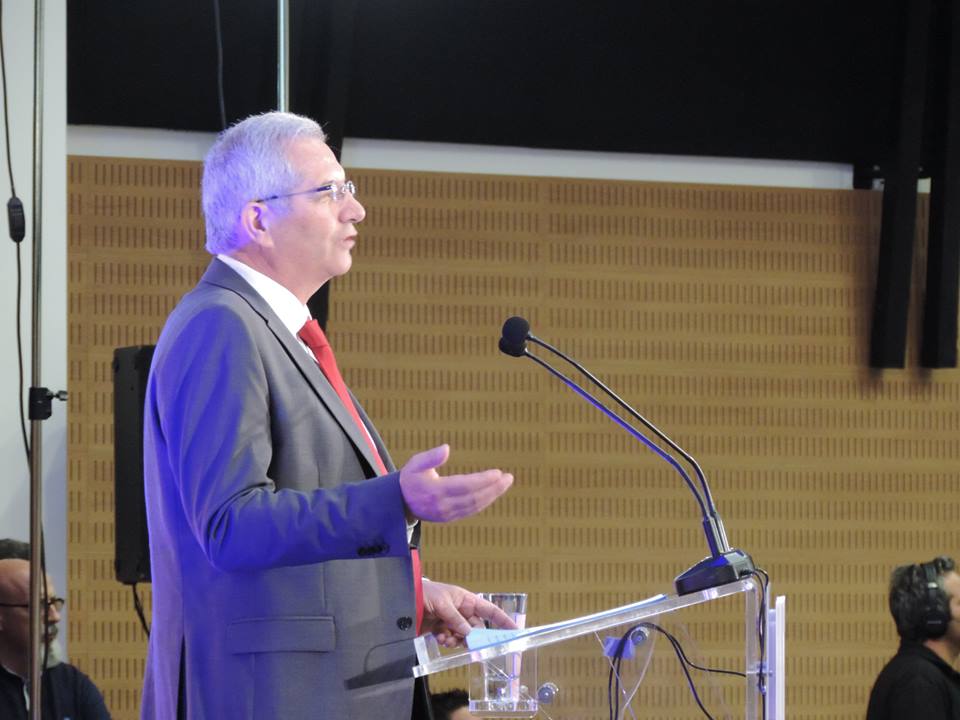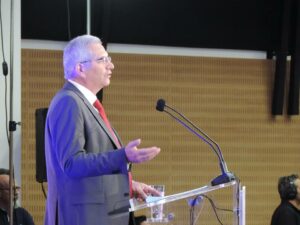
A powerful AKEL is a guarantee for a proper course and correct solution to the Cyprus problem
Statement of Andros Kyprianou, General Secretary of the C.C. of AKEL, at the press conference on the Cyprus problem
AKEL C.C. Press Office, 16th May 2014, Nicosia
It took fifteen months since the election of Mr Anastasiades to the Presidency of the Republic for the substantive negotiations to resume on the Cyprus problem. Valuable time has been lost. However, we must look ahead. Today’s challenge is for us all, to the extent it corresponds to them, to make every effort to support the negotiation process and reach the desired goal which is none other than the solution of the Cyprus problem based on principles.
For AKEL the partitionist status quo is not an option. It is not an option because it consolidates the de facto partition, which in turn ultimately leads to the concession of territories to Turkey, the staying of the occupation troops, the continuous increase in the number of settlers and the gradual loss of the Greek Cypriot properties in the occupied areas. Moreover, the solution of the Cyprus problem based on principles will make a decisive contribution towards overcoming the enormous economic difficulties we face. To fulfil this goal, it is important to draw lessons from the accumulated experience of the past and especially over recent months.
AKEL had a very clear position from the beginning, namely that the talks should not start from scratch, but should continue from where they had left off. The basic convergences Christofias achieved with Talat, from which Eroglu is persistently trying to disengage from, must be protected. If we do him a favour by abandoning them, the inevitable result will be an endless and fruitless negotiation, with the danger of a solution from outside forces being imposed on us. Now that the myth about “unacceptable concessions” and “generous offers” supposedly made by Christofias have been completely refuted – a fact which was confirmed in the document recording the 2008 – 2012 convergences – there is no reason, other than trying to save face and serving petty considerations, not to defend what has been achieved so far. That is the surest way to avoid any dangerous pitfalls.
What should have been done from the very beginning was the reaffirmation of the Christofias-Talat joint communiques and convergences and to subsequently start the substantive discussion on key pending issues. Instead, events were preceded by two unnecessary stages, wasting valuable time and we can all see where this all led to: a five-month adventure whose outcome was an inferior and weaker joint declaration for our side, mainly with regards the issue of sovereignty. Following that, we had the stage of the procedure to clarify each side’s positions which naturally led to a significant widening of the gap between the positions of the two sides.
The beginning of the phase of substantive negotiations represents the start of a critical juncture on the Cyprus problem. We cannot afford another failure in the efforts to find a solution. This does not mean that we will accept any solution. If however this procedure were to fail as well, then this effort must be shown and clearly recorded that the responsibility lies with the Turkish side and not ours.
In the event of a deadlock on account of our own or shared responsibility, then we should probably forget the solution of the Cyprus problem as we had been seeking it till today.
How, then, can we breach the gap that has widened with the completion stage of the process to clarify each side’s positions? For sure, this will not be achieved with a negotiation of the Cyprus problem from scratch. This has already been tried and tested in practice and failed, as in the case of the effort to draw up the Joint Declaration and during the clarification procedure we mentioned.
If lessons are drawn from this experience and the logic of rejecting basic convergences continues, Cyprus will experience new unnecessary adventures with very perceptible dangers: We will end up conducting an endless and unproductive negotiation which in turn will lead to the degeneration and ultimate collapse of the procedure itself.
If this were to happen, second thoughts will begin to be made once again by “friends” regarding the solution sought. The first objective will be the upgrading of the pseudo-state from an illegal to a non- recognized entity. Direct trade with the occupied areas, the legitimization of flights via the airport of Tymbou (Note: a village in the occupied areas), the representation of the Turkish Cypriot community in the European Parliament and various other actions will be promoted with a new vigour towards this end. And of course, pretexts would be given for an attempt to impose a solution from outside, which anything but will satisfy our legitimate pursuits.
For all the above reasons, the substantive negotiation cannot and should not start from scratch. Nor can we think of any reason that would support such an action, since all the talk about the alleged “unacceptable concessions” of our side has proved to be baseless.
The recent decision of the European Court of Human Rights, which awarded compensation worth 90 million Euros for the relatives of the missing persons and the enclaved people in the occupied areas, is a vindication of the application filed by the Republic of Cyprus in June 2012. It is important to note the fact with the decision Turkey has not been absolved of its responsibilities on the property issue, despite the fact that at an individual level the procedure of recourse to the Compensation Committee continues unfortunately to apply. This specific decision of the ECHR is undoubtedly a positive development and strengthens our side’s arguments for a solution based on principles. It goes without saying that this legal success must not lead to complacency, since the only way the tragic consequences of the occupation and the unacceptable status quo can be lifted is the achievement of a comprehensive political solution to the Cyprus problem.
In turn, the fair and sustainable under the circumstances solution cannot be achieved without the active assistance of the United Nations and the international community in general, and in particular of all the permanent members of the UN Security Council. It is within this context that we view the impending visit of US Vice-President Biden on the island, which illustrates the enhanced US interest for a solution of the Cyprus problem. Our own side’s role is to act and work in a way that channels this interest in the proper direction.
I have analysed AKEL’s views. However, all opinions are respected and we must together seek the best possible decisions in the National Council (Note: an advisory body to the given President of the Republic on the Cyprus problem composed of all the parliamentary parties and former Presidents). The President of the Republic has of course the primary responsibility to work towards forging unity. All the political forces, in turn, have a duty to handle the extremely difficult cause of the solution of the Cyprus problem far from any petty-party considerations and based on principles. I am convinced that with the dialogue within the framework of the National Council we can at least agree on minimum common positions, so as to strengthen the position of our side. AKEL declares that it is more than ready and is indeed already working in this direction. We support the negotiation process because there is no other way to solve the Cyprus problem, which remains for us a top priority.
We call on the people of Cyprus in the European elections to support the election list of AKEL-Left-New Forces.
A powerful AKEL is a guarantee for a proper course and correct solution to the Cyprus problem.





